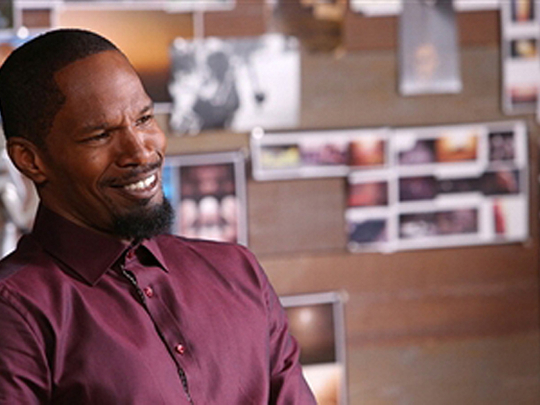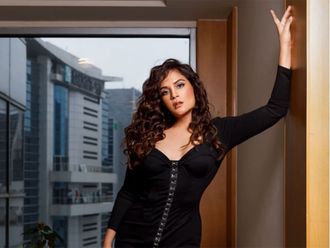
Last seen in the A-list-packed comedy Horrible Bosses, Jamie Foxx once again finds himself lining up alongside Hollywood’s finest when he stars in this month’s hugely anticipated Django Unchained. Written and directed by Quentin Tarantino, the film is a western set in America’s deep south before the end of the Civil War. Foxx plays a slave temporarily freed to rescue his kidnapped wife (played by Kerry Washington).
It’s his first film with the maverick director, and it’s a strange cineaste who isn’t frothing over the idea of a movie that brings together the likes of long-time Tarantino favourite Samuel L Jackson, Leonardo DiCaprio and Christoph Waltz, who secured a place in the pantheon of great Tarantino characters with his role as the mesmerisingly wicked Hans Lander in Inglourious Basterds.
Still, no one’s likely to eclipse the Oscar-winning Foxx in Django. He talked to alpha. about his titular role in the film, Tarantino’s unrivalled genius for impromptu script rewrites and why he claims the director’s film-making style encapsulates the spirit of hip-hop.
Do you see a musical quality to the way Quentin writes dialogue and the way you speak it?
Quentin Tarantino is a hip-hop artist, I told him that. I said, “You’re hip-hop, and hip-hop is like this.” People told me, we keep seeing surprises and we keep seeing a clip here, a clip there. I said that’s because Quentin is hip-hop. A hip-hop artist will drop a single, leak something over here, drop something over there.
The way his dialogue is, it is musical. On the spur of the moment, he re-wrote the end of Django Unchained. He says, “My ending doesn’t work.” We’re like, “Well, what are you going to do?” He says, “Give me a second.” So he goes to his trailer, and comes back with the end of the movie. Nobody else does that. When a writer writes a movie, he goes in a cabin and is there for like nine months. This dude just went in his trailer. So that’s the different musical quality of him. Basically, he’s riffing, but he’s riffing as a genius would – like Mozart.
How much better was that second ending?
There are talented people and there are God-gifted people. He’s a God-gifted person, because he went away, he did something. You could tell that it was troubling him, and when he got it he came back and he was like, “I got this now.” And it was just amazing. You’ll see it in the movie, I don’t want to give it away, but it’s classic and it ends up with just myself and Samuel L Jackson at the very end of the movie.
I even mentioned to Quentin, I said, “Samuel L Jackson was just housing the part.” People wouldn’t go to sleep. I know Kerry [Washington] will probably tell you, you wouldn’t go to sleep at night because you know you’ve got to act against Samuel Jackson the next morning. And he was kicking everybody’s ass in the scene like this. So he made the ending appropriate.
Do you have an opportunity to sing in the movie?
No. I sang but I sang badly. On purpose.
Is that hard to do? Good actors trying to act badly?
I had to do it but it was only for that bit so it was cool. It makes sense in the movie.
Could you possibly do a song for the soundtrack?
I know that John Legend sent a track to Quentin Tarantino, which is amazing. He sent it to Quentin on a cassette tape because he knows Quentin doesn’t like technology. Then I ran into [rapper] Rick Ross. I said, “Rick, you should come by the set because I know Quentin doesn’t do original stuff, but it wouldn’t hurt for you to come and just feel it, because Django is hip-hop. This is a different thing.”
So Rick Ross shows up, a huge fan of Quentin, and I said, “Rick, if you’re going to write a song, I think you should say these words: I need 100 black coffins for 100 bad men, dig 100 black graves so I can lay they ass in. 100 black coffins.” So that would be my contribution. Now what he’ll do with it, I don’t know. But if he does what I think he’s gonna do it’ll be great.
Was there music on the set?
Quentin Tarantino would play music in between takes. The most courageous person in this movie is Kerry Washington, because [the rest of us] are all guys. If you do something bad to guys, that’s sort of to be expected. But when Kerry had to take lashes, that was the toughest scene. So I asked, when they were giving her lashes, if we could play a song by Fred Hammond, a gospel singer. The song was [starts singing], “No weapons formed against me, shall prosper.” So while they’re doing it, imagine there’s this row of shacks and they’re about to give her lashes there. They had speakers set up throughout the whole place.
When that song was playing, some of the extras, including one black lady from New Orleans who was an extra and who’d never been on a set before, she knows that song and I see her hands go up. And I see her rocking back and forth with the child she was standing with. And as you see Quentin Tarantino shooting, you see him do like this [jerk up], because he was so touched – tears filled his eyes. It was some amazing thing and you’ll see it. When you see it on the screen, you’ll feel it.
Did Quentin give you any reference movies to watch, westerns or otherwise?
Yes, one of the original Djangos, Franco Nero was there. I was like, wow. It was amazing to actually have him in the movie. I don’t know if you’ve ever met him but he was the biggest star on the set. For him to give his blessing, I think it really follows true to it and I think that’s what’s going to be the pleasant surprise to people – that it’s a western and that it stays along the lines of a western that happens to be [set against] the backdrop of slavery.
Slavery almost becomes secondary at a certain point because at the beginning he’s a traditional slave. Then once he becomes this bounty hunter, that’s the backdrop. Now it’s about revenge and about getting this girl, so he stayed true to that, and that’s cinematic.
Do westerns mean anything to you specifically?
Yeah, I’m from Texas, man. When [Tarantino] said I was going to wear the green jacket, I said, “I’m going to wear the green jacket from [the TV series] Bonanza?” He said, “yeah”. As a kid, whether you were black or white or Hispanic, when you were growing up everybody watched Hee Haw, everybody watched Bonanza, everybody twirled little plastic guns. And in my home, the Brown family, we actually had a rodeo. We had horses. We didn’t do bull riding but we did tricks and stuff like that. So it was real cool and I also get a chance to ride my own horse in the movie.
What was it like working with Kerry again?
Oh man, Kerry’s a riot. She’s not a daffodil. She’s not weak. She was in there with the big boys and giving a performance that, to me, really makes the movie move. Because if the movie was simply about revenge, then you’d be bored, you’d tire of it. But the fact that this man just wants his wife back, and the way she holds on for him is just amazing.
You were really able to reinvent yourself as a dramatic actor. Is Django Unchained another reinvention for you?
All I can say is thank you to Quentin Tarantino. I told him that if he gets married, I’ll sing at the wedding. I’ll DJ in his bedroom if I need to. It really does come down to moments like this in this business, they can change your career. Now I don’t know what I would do if I wasn’t in this movie, but this movie is, I think, one of the ones that may change the trajectory of where I was going, so thanks to him.
The Interview People












